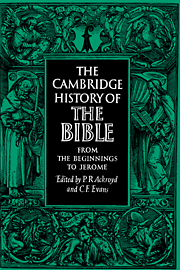Book contents
- Frontmatter
- I LANGUAGE AND SCRIPT
- II BOOKS IN THE ANCIENT WORLD
- III THE OLD TESTAMENT
- IV THE NEW TESTAMENT
- 9 THE NEW TESTAMENT IN THE MAKING
- 10 THE NEW TESTAMENT CANON
- 11 THE NEW TESTAMENT TEXT
- 12 THE INTERPRETATION OF THE OLD TESTAMENT IN THE NEW
- V THE BIBLE IN THE EARLY CHURCH
- Bibliography
- Abbreviations
- Notes on the Plates
- Indexes
- Plate Section">
- References
9 - THE NEW TESTAMENT IN THE MAKING
from IV - THE NEW TESTAMENT
Published online by Cambridge University Press: 28 March 2008
- Frontmatter
- I LANGUAGE AND SCRIPT
- II BOOKS IN THE ANCIENT WORLD
- III THE OLD TESTAMENT
- IV THE NEW TESTAMENT
- 9 THE NEW TESTAMENT IN THE MAKING
- 10 THE NEW TESTAMENT CANON
- 11 THE NEW TESTAMENT TEXT
- 12 THE INTERPRETATION OF THE OLD TESTAMENT IN THE NEW
- V THE BIBLE IN THE EARLY CHURCH
- Bibliography
- Abbreviations
- Notes on the Plates
- Indexes
- Plate Section">
- References
Summary
Christianity is unique among the world religions in being born with a Bible in its cradle. The limits of the Old Testament may not have been finally fixed by the New Testament period, but there was already sufficient definition for its books to be referred to collectively as ‘scripture’ (η γραφη) or ‘the scriptures’ (αι γραφαι), and to be further specified as ‘the law (Moses) and the prophets’, or in one instance, possibly reflecting liturgical usage, as ‘the law of Moses and the prophets and the psalms’ (Luke 24: 44). There was nothing quite like this phenomenon in the civilised world, and its effects, both positive and negative, on the first Christians were far-reaching. As their only literature and as their principal frame of reference, its positive effect was to evoke and direct their theological thought and eloquence; and in the case of Gentiles to introduce them to not only the foreign substance but also the foreign idea of an authoritative Bible, to a habit of mind which expected the issues of life to be decided by appeal to it, and to a familiarity with its text in the often inaccurate Greek (Septuagint) version sufficient for them to recognise indirect allusions as well as direct citations. It would be a distortion to picture Christians as everywhere engrossed in the study of the Old Testament, for most would be incapable of it and the scriptures would rarely be the possession of the individual, but the claim already present in the probably pre-Pauline formula of 1 Cor. 15:3 f. that the gospel was ‘in accordance with the scriptures’ (κατα ταζ γραφαζ—an all-embracing expression without exact parallel in the rabbis, who generally referred to particular passages), or, which comes to the same thing, that it was ‘according to the definite plan and foreknowledge of God’ (Acts 2: 23), argues at least among some of their leaders and in some of their assemblies a considerable activity of biblical research and debate.
- Type
- Chapter
- Information
- The Cambridge History of the Bible , pp. 232 - 284Publisher: Cambridge University PressPrint publication year: 1970
References
- 9
- Cited by



